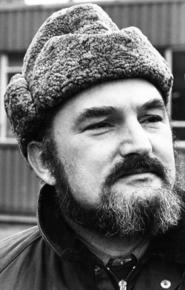Alan Brien
Original, omnivorous journalist on papers ranging from the Daily Mail to the Observer
Of all the young circus lions who livened up Oxford University after the second world war, the journalist Alan Brien, who has died at the age of 83, was the most exemplary. He came from a humble background or, as he put it, carried his working-class passport. He had flown with Bomber Command, was already married, and would most likely never have been able to afford any university but for the grants that were readily available to ex-servicemen.
At Jesus College, he read English literature and shone in university journalism; he went on to do the same in the outside world - as a foreign correspondent, drama critic and columnist. At the same time, he contracted a trace of the malaise which Cyril Connolly had identified 20 years earlier in his book Enemies of Promise, and had blamed particularly on languid seats of learning and the lure of instant earnings. These twin distractions, he argued, sidetracked too many writers from achieving the major works of which they were capable.
Brien published one considerable work of fiction - or faction - Lenin: The Novel (1987): as a journalist, however, his eminence is unchallengeable. When the founding of Britain's first new newspaper after the war, the Sunday Telegraph, was being planned in 1960-61, the first appointment to be made by the editor-designate, Donald McLachlan, was that of Brien as theatre critic. "On this we can build," McLachlan was supposed to have said. Brien's wit, authority and vivid prose duly won him and the paper the Hannen Swaffer (later IPC) critic of the year award two years running. As a columnist he held court in publications as diverse as the Daily Mail and the Sunday Times, Punch and the New Statesman.
Brien was born in Sunderland. His father drove a city tram, he claimed, though some friends suspected that he was actually an inspector. From Bede grammar school, he went into the RAF (1943-46), trained as an airgunner and flew on a number of operations in the closing months of the war, including a raid on Hitler's mountain retreat of Berchtesgaden. In 1947 he married his home-town girlfriend Pamela Jones. They had twin daughters, Alyson and Joanna, and then a third daughter, Rebecca.
His first job in journalism was not exactly the honeyed seduction Connolly had in mind. He was half the editorial staff of Mini-Kinema (1950-52), a publication for film-makers using 16mm or 9mm cameras, mainly hobbyists. He moved on to a metropolitan magazine called Courier, and from there to a dizzy succession of posts, occasionally in parallel - reviewing films for the Evening Standard, television for the Observer and theatre for the Spectator, as well as acting as its features editor.
He wrote about politics for the Sunday Pictorial (precursor of the Sunday Mirror) and about things in general, under the pseudonym of John Jelley, for the Sunday Dispatch (later reborn as the Mail on Sunday). For the Sunday Times, in the early 1970s, he was their man in Moscow and Saigon, then a diarist who chronicled his daily doings on the back page of the paper.
Though he was a great talker on any subject, he was never really taken up by radio or television. His only regular appearances were on an early ITV chat show, Three After Six, and as chairman of the BBC literary quiz game Take It or Leave It. He was always good company, loved games and outings and food and wine, as long as the last was free from snobbery. "Was thirteen-and-six a good year?" he would enquire (in pre-decimal times) when presented with the wine list by a supercilious sommelier.
Brien was married four times. His marriage to Pamela ended in divorce, and in 1961 he married Nancy Newbold Ryan, a vivacious New Yorker he had met when reporting from that city for the Evening Standard. They had a son, Adam, and a daughter, Jane. By the 1970s this marriage was failing, and on a press trip abroad, Brien met the Guardian writer Jill Tweedie. They were wed in 1973. She died of motor neurone disease in 1993. Three years later he married Jane Hill, a writer and museum curator. They set up home in north Northamptonshire at first, where he and Jill had had a weekend retreat, but at the turn of the century moved back to Highgate, north London.
Brien continued to review for the London Review of Books and the Literary Review until he was slowed down by a rare form of dementia, Lewy Body disease. He was, I suppose, the last literary-journalistic giant in the tradition of GK Chesterton, Hilaire Belloc and James Agate: original, omnivorous and lucid in his writings, a generous host and good companion.
He is survived by Jane, his five children, a stepson, Luke, from his third marriage, and seven grandchildren.
Alan Brien, journalist and writer, born March 12 1925; died May 23 2008
Philip Purser

1 comment:
Small, factual correction: Alan Brien’s father, Ernest, did indeed work for Sunderland (town, not a city, then) Corporation Tramways, but as an electrical engineer at the Hylton Road depot, and never as a driver.
I know, because I am his grandson, and he took me, as a child, into a repair pit below a tram to see the emergency ‘cow-catcher’ device that would scoop up any pedestrian unlucky enough to fall into the tram’s path.
Malcolm Carr (né Brien).
Post a Comment